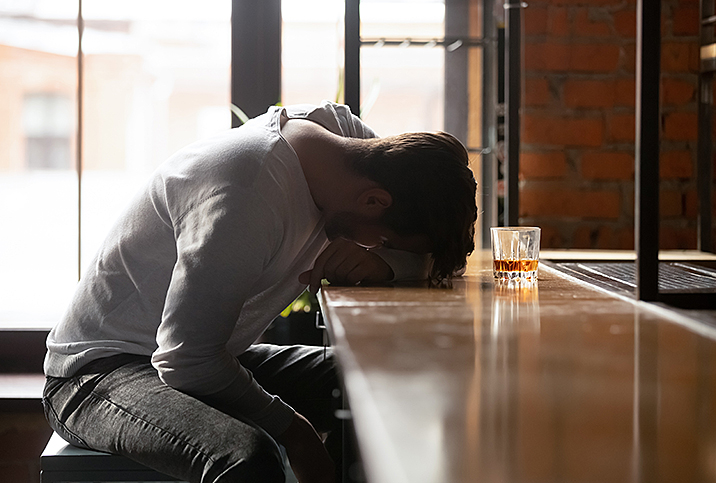Does Alcohol Use Disorder Affect Sexual Function?

Alcohol use disorder (AUD) is a chronic condition characterized by the inability to control or stop drinking despite adverse consequences. It has long been recognized as a significant health concern. When it comes to human sexuality, particularly libido, however, AUD remains misunderstood.
Alcohol in the moment lowers inhibitions and seems to amp up libido. But does AUD blunt those effects?
From the physiological effects on sexual function to the psychological and social factors at play, let's delve into the relationship between AUD and libido by exploring the scientific evidence, potential mechanisms and the multifaceted nature of this complex interplay. In what ways might AUD can influence one of our most fundamental human desires: sexual intimacy?
How does alcohol use disorder affect sexual function and libido?
"Alcohol use is strongly linked to erectile dysfunction (ED), which does not bode well for sexual performance and confidence building," said Jeremie Walker, M.D., M.B.A., a physician at Opt Health and Atrium Health in Charlotte, North Carolina.
Chronic alcohol use comes with more permanent erectile challenges, he added.
"Usually, alcohol interferes with the climatic strength of an orgasm, and it can significantly delay the time to achieve such an outcome," Walker said. "This is true for both men and women. It has also been blamed for premature ejaculation."
One of the primary ways AUD affects libido is via its impact on the central nervous system. Alcohol is a depressant that slows down brain activity. So high levels of alcohol in the body can interfere with the transmission of nerve impulses responsible for sexual arousal.
This can lead to decreased sexual desire, difficulty achieving or maintaining an erection in men, and difficulty experiencing orgasm in both men and women. Chronic alcohol use can disrupt hormone levels in the body, including testosterone.
In addition to impaired testosterone production, alcohol can cause shrinkage of the testes and problems with fertility, according to Michael Werner, M.D., the medical director and founder of Maze Sexual & Reproductive Health, based in New York City and Purchase, New York.
Testosterone plays a crucial role in sexual desire for both men and women, and reduced testosterone levels due to alcohol use can result in a decline in libido. Alcohol decreases levels of dopamine, Werner said.
An enzyme called aromatase converts testosterone to estrogen but also plays a role in alcohol-related sexual dysfunction, Werner continued. Alcohol increases aromatase activity, and more aromatase converts testosterone to estrogen.
"So it shifts that balance quite dramatically, and that gives you libido and erection issues as well," he added.
What is the psychological impact of alcohol on libido?
Consuming several alcoholic drinks can increase subjective feelings of sexual desire and arousal, but often at the sacrifice of delayed or suppressed physiologic orgasms, Walker said.
While alcohol is known to lower inhibitions and may initially create a sense of increased sexual desire, prolonged and excessive alcohol consumption can have detrimental effects on sexual health. Most studies indicate that alcohol doesn't positively affect your libido, and instead leads to more problems with erections, Werner said.
Psychologically, AUD can contribute to sexual dysfunction. Alcohol dependency often leads to emotional and relationship problems, including decreased intimacy, communication difficulties and increased conflict, all of which can negatively impact sexual desire and performance.
Additionally, feelings of guilt, shame and anxiety associated with alcohol misuse can further diminish sexual interest.
It is essential to note the effects of alcohol on libido vary among individuals. Some people may experience increased sexual desire temporarily due to the disinhibiting effects of alcohol. However, prolonged and excessive alcohol use can lead to a decline in sexual function and desire over time.
Addressing alcohol use disorder by seeking professional help is crucial for individuals experiencing negative effects on libido. By addressing the underlying causes of AUD and adopting healthier lifestyle choices, people can work toward improving their sexual health and overall well-being.
What is the relationship between alcohol, hormones and fertility?
Alcohol is known to suppress testosterone production and subsequent sperm count and quality.
"For men who are worried about their estrogen levels because of the specious link to 'man boobs,' it's better not to drink alcohol as it increases the production of estrogen," Walker said.
The same goes for women, he added: Alcohol can alter the reserve of eggs in the ovaries and affect fertility.
While moderate alcohol intake may not cause significant harm, excessive or chronic alcohol use can have detrimental effects on male reproductive health in several ways.
Sperm production
Alcohol can interfere with the production of sperm, leading to a decrease in sperm count (oligospermia) and infertility. The body metabolizes alcohol as a toxin, and excessive alcohol consumption can disrupt the delicate balance of hormone production in the body, including testosterone, which is crucial for sperm production.
Sperm morphology and motility
Alcohol can affect the shape (morphology) and movement (motility) of sperm. Research suggests high alcohol intake can lead to abnormalities in sperm shape and impair their ability to swim correctly, reducing the chances of successful fertilization.
Erectile dysfunction
Excessive alcohol consumption can contribute to ED, making it difficult to achieve or maintain an erection. ED can further affect fertility by hindering sexual intercourse and reducing the likelihood of sperm reaching the egg.
Hormonal imbalance
Alcohol use can disrupt the normal functioning of the hypothalamic-pituitary-gonadal axis that regulates hormone production related to fertility. This imbalance can lead to decreased testosterone levels, further affecting sperm production and quality.
DNA damage
Alcohol has been associated with increased DNA damage in sperm, which can impact the genetic integrity of sperm cells. This damage can potentially lead to infertility or increase the risk of genetic abnormalities in offspring.
Evidence for drinking less
In a study of men with advanced cirrhosis of the liver, Werner explained, 72 percent had decreased libido and difficulty with erections. In terms of fertility, in a study of 22 men with cirrhosis, 18 men were not able to ejaculate for the analysis. Of those who did, two men produced no sperm at all. One man had a reduced sperm count, and only one had a normal sperm count.
It is important to note the effects of alcohol on fertility may be reversible to some extent if alcohol consumption is reduced or stopped. However, recovering fertility can take time, as sperm production typically takes about two to three months.
If you and your partner are planning to conceive, it is advisable to reduce alcohol consumption or abstain from alcohol altogether. A healthcare professional who specializes in reproductive health can provide personalized advice and support in addressing any fertility concerns related to alcohol use.


















